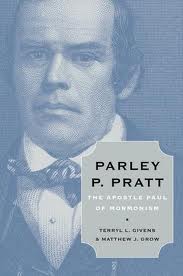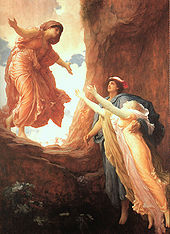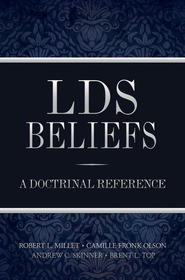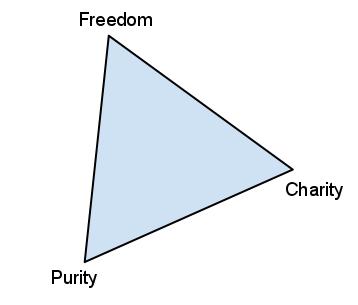-
•
•
5 responses
While perhaps not the most important symbol in the Vision of the Tree of Life (1 Nephi 8-11), the Iron Rod may be the one that has received the most attention, at least in recent decades[fn1]. But I think I was able to find something that kind of fit with the whole vision instead of just mentioning the Iron Rod. I like this hymn for not just (vaguely perhaps) invoking some of the imagery of the vision, but also for placing an emphasis on the Lord’s role in assisting us. Read More
-
•
•
16 responses
This isn’t a lesson; it is the notes from which I will prepare a lesson. Read More
-
•
•
2 responses

“If Pratt wanted to leave for posterity a record of his apostolic role in providential history, he also wanted to leave for futurity the story of the flesh and blood Parley P. Pratt (393).” Regardless of whether we agree with Givens & Grow on this point, it is the lens through which we ought to view their recent biography. Parley P. Pratt: The Apostle Paul of Mormonism is a substantial addition to Pratt’s timeworn autobiography, an attempt to fill out our understanding of the man – both who Pratt was and also the critical (though often overlooked) contribution he made… Read More
-
•
•
13 responses

After taking off 18 months or so, I’m returning to teaching Institute in my free time. Beginning January 12, 8 PM in the Union Square chapel of Manhattan, I’ll be teaching a class called “Genesis, with an Introduction to Studying the Bible in Hebrew.” The Institute Director added the last part, but I don’t mind one bit. I’m quite looking forward to it. Institute can really be a breath of fresh air, especially for those who are looking for a deeper exploration of the scriptures than Sunday School allows. After all, there’s no schedule to follow, no manual to adhere… Read More
-
•
•
4 responses
Case Background: Kiewit Power Constructors Co. contested a National Labor Relations Board decision to reinstate two fired electricians for threatening workplace violence. Kiewit Power had warned the electricians that their breaks were too long, and that they may need to take them in a different location. The electricians responded by saying things would “get ugly” if they were disciplined and the supervisor “better bring [his] boxing gloves.” In reinstating the electricians, the NLRB found the statements “were merely figures of speech made in the course of a protected labor dispute.” Kiewit appealed the decision and case landed in front of the… Read More
-
•
•
41 responses
I enjoyed the holidays this year, but I am glad they are over. The tree is no longer shedding needles in our living room, and the few lights and garlands we hung have been taken down. We celebrated a simple Christmas here, with very few decorations other than the nativities and the tree. We exchanged few gifts. We are trying to teach our children to be thoughtful and discriminating in what they choose to give each other rather than buying every single thing they think (rightly) that their siblings would enjoy. I remember a Christmas ten years ago. We were… Read More
-
•
•
18 responses
The flurry of posts at T&S and elsewhere around the Bloggernacle is a reminder that 2012 is Book of Mormon year in Gospel Doctrine class. Which Book of Mormon are you going to read? Read More
-
•
•
9 responses

(Part 3 of 4. Read the first parts here and here.) Once a year, right before our Christmas dinner, I practice the fine art of pomegranate seeding. If I’d let them my kids would eat pomegranates every day, but they’re expensive. And the juice stains. This year we have two of the fruits, spherical with thick skins of dull red. I choose one and use a serrated knife to saw through its center. The fruit falls in halves on the cutting board, revealing plump clusters of seeds separated by paper-thin pith. Juice seeps from the wound and runs down the… Read More
-
•
•
8 responses
In looking for a literary work to go with the second Gospel Doctrine lesson this year, I was struck by some of the parallels between what Nephi experiences in the first few chapters in the Book of Mormon and what the early Mormons went through in traveling to Utah. Many of those we call the pioneers left comfortable homes, like Nephi and his family, and traveled to a “promised land” “into the wilderness.” And perhaps half or more of the pioneers also had to travel over an ocean to reach the promised land. Read More
-
•
•
29 responses
Again, this isn’t a lesson. It is the notes from which I will prepare a lesson. Sorry it is so long. (The rabbit trail of the week was related to the killing of Laban, but I don’t plan on discussing that with my class.) Read More
-
•
•
34 responses
This post opens the voting for Mormon of the Year. Votes will be taken until midnight Eastern Time on Saturday, January 7th, at which time the voting will close. The voting mechanism will attempt to restrict votes to one per person. The order of the choices is set at random, and is different each time the form is presented. THE WINNER OF THE ONLINE VOTE IS NOT NECESSARILY THE MORMON OF THE YEAR!!! Read More
-
•
•
5 responses

(Part 2 of 4. Read the first part here). Between the Washington Beltway and the Delaware coast lay 150 miles of waiting. Waiting, and watching, and sweating with boredom as my grandmother’s Oldsmobile slowly cruised Route 50. We took this road every summer, me and my brother and our Yia Yia Christine, leaving behind the Maryland suburbs for the Lynard vacation spot on Rehoboth Beach. Read More
-
•
•
9 responses
I’m no stranger to doubt and scepticism – I’m as much a child of conflicted modernity as anyone and it has been years since the majority of those close to me have professed an unwavering belief – and context is as relevant to testimony as anything else. But tonight I want to state candidly and unreservedly: I believe. There’s something genuinely magical (and I feel that quickening magic now) in the bearing of a testimony – I count my experience with testimony as one of the grand mysteries I’ve encountered in life. I can’t help but continually try to cast… Read More
-
•
•
3 responses
I’m pleased that Julie has begun a series of posts that cover this year’s lessons on the Book of Mormon. With this post I will begin a kind of companion series: Mormon poetry and literary texts that can accompany each week’s lessons. Since Mormon literature often gets short shrift (usually from those who haven’t actually read what they dismiss), I think that connecting this literature to a regular part of our worship may help members become more aware of and familiar with our culture. Read More
-
•
•
23 responses
These are the notes from which I will create my Sunday School lesson. It is not a Sunday School lesson, unless your ward has Sunday School for five hours and a high tolerance for rabbit trails that happened to catch my interest. Read More
-
•
•
5 responses
“O come, all ye faithful, joyful and triumphant.” My eyes started welling up as we sang in church this morning. I want to answer the call to come, but I don’t know that I can call myself faithful. So often, I feel my lack of faith, my doubt, my cynicism. And I work all the harder for it. I cling to my covenants, for that is keeping the faith, even when I cannot rationally affirm articles or propositions expressing the faith of my fellow saints. I serve in good faith, with all my might, mind, and strength, even when I… Read More
-
•
•
3 responses
Finals are graded, so yesterday I made red onion marmalade.[fn1] Stirring the apples and red onions and lemons, I though about what food evokes Christmas for me.[fn2] Why food? Because a lot of my life today revolves around food. One year, I was up until two in the morning the day before Thanksgiving making mincemeat ice cream. (I didn’t believe my wife that we were getting up the next morning at 4 to see the Macy’s Thanksgiving Day Parade. Turns out, she was right.) Every summer, we can tomatoes and jams and chutneys so that we can have those flavors… Read More
-
•
•
33 responses

With the impending vote, most Mormons may assume that Mitt Romney is the clear favorite. He has been the most consistent front runner for the Republican nomination for President this year, and his views may be most consistent with those of most Mormons. So why vote for Jon Huntsman, Jr.… Read More
-
•
•
12 responses

The latest book to digest Mormon doctrine for the popular LDS audience is LDS Beliefs: A Doctrinal Reference (Deseret, 2011), by four BYU religion professors: Robert L. Millet, Camille Fronk Olson, Andrew C. Skinner, and Brent L. Top. Entries are alphabetical, with authorship and cited sources listed following each and every entry. It’s out just in time for Christmas and will no doubt find its way under the tree in many LDS homes, as well it should. The best way to summarize the strengths of this one-volume reference work is to compare and contrast it with other modern attempts to… Read More
-
•
•
5 responses

(part 1 of 4) A strange autumn. The gold harvest sky, usually so calm and calming, is full of unrest. Nervous pigeons cluster near the freeway overpass. Above them circle the gulls, those inland outlanders who should be pulling fish from the sea. Nameless small dark birds coalesce into rolling, chattering clouds before dropping to roost on rooftops and treetops and utility wires. Read More
-
•
•
19 responses

Yesterday I dedicated the grave of my grandfather, Verl Bagley, who by one measure spent his life at the end of the earth. Read More
-
•
•
One response

The first Institute class held in our upper Manhattan apartment in 1988 explored Mormon philosophy and intellectual life. The readings included a 1969 Dialogue article by Leonard Arrington, “The Intellectual Tradition of the Latter-day Saints,” (pdf) which mentioned a questionnaire Arrington had sent to 50 Mormon intellectuals asking them to list the five most eminent intellectuals in Mormon History. I was then surprised to find Parley P. Pratt on that list. Read More
-
•
•
39 responses
We opened nominations for Mormon of the Year 2011 on December 9th. To keep everyone up to date, here are the nominations so far. Nominations remain open through December 31st, and a public vote on the candidates will begin January 1st. Feel free to make additional nominations or second any of those that have not yet been seconded, if you think they are worthy. Read More
-
•
•
26 responses
A thought inspired by Aquinas’ review, which focuses on the teacher, instead of the manual. If I had any Photoshop skills, I’d have put the manual in the middle of that ring. Reference comes from Aquinas’ post. I taught the Teacher Training course for a few months earlier this year, which meant I spent a lot of time with Teaching:No Greater Call. I discovered an important and surprisingly subversive story p. 214-15, presented below with minor editorializing in brackets and bolding. “In our new ward my husband and I discovered that the Gospel Doctrine class [read: the teacher] wasn’t very… Read More
-
•
•
19 responses
Christmas is awesome as a kid because you get cool stuff that you can’t get any other time. (Yeah, yeah, you can tell me that Christmas is awesome because we celebrate the Savior’s birth or because we get to serve people, but if you were a kid like I was a kid, it really just came down to presents and time off school.) Now here’s my “kinds of presents” list: Stuff the recipient doesn’t want (like Christmas ornaments — who ever thinks, “I’d love a Christmas ornament”?) Stuff the recipient likes and would probably get for themselves anyway (like clothes)… Read More
-
•
•
97 responses

FOX News was on while I stood in line at McDonald’s last night. I noticed that the guy being interviewed looked distinctly Mormon (apparently we have a distinctive look), so I walked over to see what was up. The guest was Connor Boyack, and he was talking about how, of all the political ideologies, Mormonism is most compatible with Libertarianism. The Mormon-Libertarian connection is nothing new, but it fits in with something that’s been on my mind lately — competing “goods”. Or, in Elder Oaks’ words, “good, better, and best”. As I see it, there are three cardinal points of political virtue… Read More
-
•
•
35 responses
You can read the study itself here or a summary of it in the DN here. Read More
-
•
•
83 responses
The Church announced that it has released a revised Strength of Youth pamphlet. Read More
-
•
•
30 responses
Joseph Spencer, in his encouraging response to Taylor Petrey’s Dialogue article, “Toward a Post-Heterosexual Mormon theology,” makes the following claim: Read More
-
•
•
48 responses

The long-delayed NBA pre-season starts Friday, much to the delight of the nation, and, of course, the Jimmer Fandom (Jimmermaniacs?). And as I reviewed the information I’ve clipped about Mormons in basketball, I faced a surprising conclusion: Jimmer is the only Mormon currently playing in the NBA. Could that be right? If it isn’t, I’d love to know. And if it is, perhaps that is a reason for Jimmer to be named Mormon of the Year? Read More
